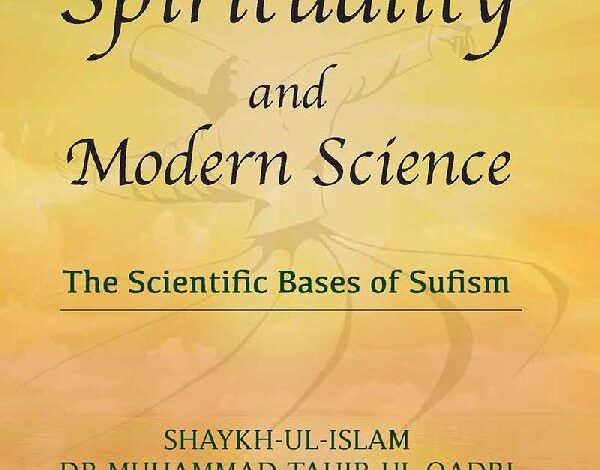WOMEN, MYSTICISM & SCIENCE: AN ISLAMIC PERSPECTIVE WITH INSIGHTS OF DR. MUHAMMAD TAHIR-UL-QADRI
‘Book knowledge’ or the knowledge of the words of the Qur’an and hadith is known as ilm-e-safina, while ‘the knowledge of the heart’ was known as ilm-e-sina.

By Sadia Khanam, WordForPeace.com
Mysticism refers to a complete spiritual path to attain close and deeper personal relationship with the Divine, as Ghulam Rasool Dehlvi, the Founding-Editor at WordForPeace.com defines it in his various articles on Mysticism. To put it precisely, Mysticism in world religions, as I perceive, is an association of human beings with the heavenly or eternal energy, and an unambiguous contact with the absoluteness of the Divine. When it comes to gender equality in Mysticism, one has to keep in view that masculinity or femininity make no difference to the essence of human nature. All means to reach perfection are consequently open to women just as they are to men.
Mysticism in Islam:
Noted Islamic scholar and founder of the Minhajul Quran International (MQI), which also runs various social, educational and interfaith institutions like the Minhaj Interfaith & Welfare Foundation based in India, has elaborated the concept of Islamic mysticism or spirituality in these words:
“It cannot be refuted that faith becomes the driving force of a person’s life, once experimentation and observation have corroborated it. The question arises as to how this culmination of faith can be achieved. How can a person have his faith confirmed by means of experimentation and observation? Scientists carry out experiments to validate their theories. So, is there any possibility of validating faith in the tenets of Islam by means of observation and experiment? The answer is: “Yes, there is a system which brings about tangible results from faith by means of observation and experiment”.
“This system based on spiritual experiments and observations, is known as Tasawwuf or Sufism in English, which is in itself a complete science of spiritual development”, writes Shaykhul Islam Dr. Muhammad Tahirul Qadri in his book titled, “Islamic Spirituality and Modern Science”: The Scientific Bases of Sufism” (Published by Minhaj Publications India).
The term ‘Sufi’ or Tasawwuf originates from the Arabic root letters “SUF” which stands for “wool”. In the prophetic times, there were people who used to wrap a woollen garment, which was a specification among the poor. Thus, the specific woollen garment known as “SUF” was worn in the Arabian Peninsula in order to portray poverty in literal sense but in its extended meaning, it implies that they had rejected the materialistic world, its amusement and luxuries so that they can procure the unlimited pleasure and unconditional love of God.
Origin of Sufism
The Sufis trace the origin of Sufism or tasawwuf to the Prophet of Islam. They believe that there were two aspects to the revelations received by the holy Prophet (pbuh): One took the form of the words of the Qur’an, and the other that of the divine inspiration within the heart. The former was meant for all, while the latter was to be imparted to the chosen few and conveyed directly ‘from heart to heart’. ‘Book knowledge’ or the knowledge of the words of the Qur’an and hadith was known as ilm-e-safina, while ‘the knowledge of the heart’ was known as ilm-e-sina.
The faith and practice of Islam is made up of three components, which together form the basis of Islamic religion. These are: iman, or belief in the revealed word of God; ita’ah, or submissiveness with the shahaadah (witnessing); and ihsan, or the practice of virtue and sincerity.
Sufi mystics emerged in Islam at a very early stage. Most of them were highly spiritual persons who were disgusted by the vulgar demonstration of wealth and degeneration of morals in the aftermath of Islam’s politico-military triumph. Some of the Sufi pioneers such as Hasan Basri and his disciple, the woman Sufi Rabia (d. 8th century A.D.) reiterated the importance of prayer, continual fasting and unconditional love of God.
Ibn Khaldun has aptly summed up the way of life of the early Sufis: ‘The way of the Sufis was regarded by the early Muslims as the way of Truth and salvation. They zealously guarded piety, gave up all objects of worldly attraction for God’s sake, renounced pleasure, wealth and power, abandoned society and led a secluded life devoted to the service of God. These were the fundamental principles of Sufism that prevailed among the companions and Muslims of the early times.
Moreover, if they need to want to gain the love of ALLAH they would need to remove the love for the world from their hearts as ALLAH and the Prophet constantly reminds us:
“And do not strain your eyes towards what we have given some of them to enjoy from the splendour of life of this world, through which we only test them. The provision of your lord is better and more lasting” (Al-Quran 20:131)
Mysticism and Women
“One of my most favourite Qur’anic verses is as follows in Surah Al Ahzab:
“For Muslim men and women,- for believing men and women, for devout men and women, for true men and women, for men and women who are patient and constant, for men and women who humble themselves, for men and women who give in Charity, for men and women who fast (and deny themselves), for men and women who guard their chastity, and for men and women who engage much in Allah’s praise,- for them has Allah prepared forgiveness and great reward.
(Translation— Yusuf Ali)
The above verse makes it patently clear that Spirituality in Islam is not just accorded to men, and that Awliya Allah (Saints) are not only men but rather it is also intended for women to be friends of God.
In fact, a woman can also be one of the “Awliya” of Allah—friends of God who are spiritual masters and preceptors of the Islamic spiritual system, as defined by Dr. Muhammad Tahirul Qadri. He writes: “When a person’s belief in the Unseen passes through the stages of development brought by the practice of Sufism, it changes into unshakable faith. Awliya of Allah in Sufism raise an inward observation of faith to the zenith of absolute certainty. When Sufism, by means of practical spiritual experimentations, verifies someone’s faith, their faith becomes unshakable. The Awliya of Allah (friends of God) pass through much rigour and hardship on the way to substantiating their faith”.
(Islamic Spirituality and Modern Science”: The Scientific Bases of Sufism, Minhaj Publications India)
Much like the male Sufis and Awaliya of Allah, female Sufis and woman Muslim Mystics also appeared in the early history of Islam, and an equal dignity and status of sainthood was conferred on women as much as men. Sufis themselves have chosen the famed mystic woman Rabia Basri (died 801) as the representative of the first development of mysticism in Islam. Further to the point, Sufism is based on the concept of “Wisal e ilahi” i.e. seeking Union with the Divine through love and devotion, and does not leave space for the distinction of sex. Islam has no order of priesthood and nothing prevents a woman from achieving great mystical heights.
Islam is no exception to the commonplace that women seem to have played a minor role in the elaboration and transmission of spiritual doctrine in the three monotheistic religions. But as a result of widespread ignorance of the history of Islam, even amongst the Muslims themselves, it is often hastily held that Islam has been intrinsically misogynist, as if women had never been given the slightest prominence in its history. And yet the role played by women, or the position they have often acquired with difficulty, has not followed a smooth course throughout nearly fifteen centuries of Islamic history.
Scientific Bases:
According to the above-mentioned book by Dr. Tahir-ul-Qadiri, “Islamic Spirituality and Modern Science” there is a dire need to clarify the misunderstandings and confusions about Islamic spirituality on scientific grounds. It goes on to substantiate the following points:
“Young people all over the world, Muslim as well as non-Muslim, are brought up and educated in an environment permeated by scientific materialism. It is modern learning which programmes their minds and causes them to reject anything they find incompatible with what they have been taught about man and life on the earth.”
“Scientific orthodoxy refers to magnetic sensitivity in human beings, electromagnetic energies that permeate our atmosphere, the flow of positive and negative ions in the atmosphere affecting human brain activity, the function of the pineal gland and many other empirical sources of transcendent experience that are yet to be investigated. This magnetic energy basis of spiritual experience, which the scientific camp has been forced into revealing, has proved to be a welcome development of modern science from the point of view of Islamic spirituality.”
Author of this article, Sadia Khanam is the coordinator and counsellor at the recently established Minhaj Learning and Research Centre (MLRC) in Abul Fazl, Okhla, New Delhi. She has completed her master’s in International Studies at Arab Culture Center, Jamia Millia Islamia University.




